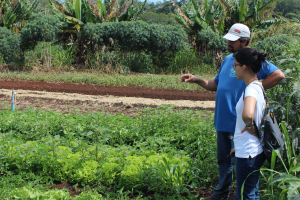 Larissa Ushizima, originally from Brazil, is just finishing her last semester in the International Affairs program at The New School. In 2014 Larissa participated in the International Field Program (IFP) to Colombia where she worked with a local government to help strengthen community engagement mechanisms for designing ecotourism initiatives. She applied this work to her thesis, which analyzes tourism-agriculture linkages in Brazil and traveled to Bonito, Brazil during January 2015 to conduct field research after receiving a small award from the Milano School.
Larissa Ushizima, originally from Brazil, is just finishing her last semester in the International Affairs program at The New School. In 2014 Larissa participated in the International Field Program (IFP) to Colombia where she worked with a local government to help strengthen community engagement mechanisms for designing ecotourism initiatives. She applied this work to her thesis, which analyzes tourism-agriculture linkages in Brazil and traveled to Bonito, Brazil during January 2015 to conduct field research after receiving a small award from the Milano School.
Did you have an interest in tourism policies before participating in the 2014 IFP to Colombia?
Tourism has always fascinated me as a field of study, but before the IFP I hadn’t had the chance to specifically study tourism policies. During the IFP Seminar and the field research in Colombia, I could further my knowledge on tourism development, especially on the direct and induced effects of tourism to the community. During the Colombia IFP, I realized that I wanted to study tourism policies even deeper.
 In what ways were you challenged on the Colombia IFP?
In what ways were you challenged on the Colombia IFP?
I felt very challenged and motivated during the Colombia IFP. The best example was working in a multicultural environment. My team had one Colombian undergraduate student from Universidad Autónoma de Manizales (the local partner in the program) and three American graduate students from The New School, besides me. We had different language and academic skills and managed very well to take the best advantage of it. This is not trivial in a working environment, especially in a different country. As a team, we were able to collaborate and bring our specific knowledge to the table, including academic and previous experiences with sustainable practices, capacity building, Colombian history, etc. It was really exciting to build a cohesive team and deliver results to the community in such a short period of time (less than two months).
Why did you choose to focus your thesis on tourism in Brazil rather than continue the ecotourism research you started in Colombia?
My career goal is to work for the Brazilian federal government after finishing my studies abroad. That is why I decided to delve into a case study in Brazil and better understand the linkages between smallholder farming and tourism. In fact, the IFP in Colombia was an amazing opportunity to understand the policy environment of another Latin American country and gain hands-on experience on policy implementation. One of our deliverables during the IFP was generating a demand analysis of food products in La Merced, where we lived, including a set of recommendations on how to foster a local food system. This type of research is similar to what I am currently doing in Brazil.
During your research in Bonito, Brazil did you uncover anything that surprised you or drastically changed the direction of your thesis?
My fieldwork provided several surprising and interesting data. For example, smallholder farmers are aging in the state of Mato Grosso do Sul, which means that local food is currently being produced by farmers age 50 to 60. This finding has serious policy implications: there is a generation gap in these small farms I visited. Most farmers’ children have a college-level education and no longer want to work with farming. Even though this is not the main focus of my research, I have been intrigued by the consequences of this finding for local development and small-scale farming in the locality.
Do you have any funny or interesting 2014 IFP Colombia stories?
After living and working together with four people for almost two months, I have many stories to tell! Before going to Colombia, I suggested to the group that we “adapted” our names and used first names that the community would easily remember. Cameron decided to use Cami, Meg would use Melita and Katherine would use Katerina. Actually, I was completely wrong. People did not have any trouble in remembering Cameron’s or Katherine’s names (people used to say to Cameron: “Like Cameron Diaz!”). The real issue was Meg, who has light-blond hair. Everyone would call her “Monita” or “Mona,” which are friendly and acceptable ways to refer to her hair color! In the end, the whole community remembered our names, especially “Monita’s.”
What advice would you give to students participating in the 2015 IFP in Colombia?
The Colombia IFP is an excellent on-the-ground experience in Latin America. This program is unique because it combines primary research with professional experience, as the teams work as consultants to a project developed in the community. Moreover, Colombia IFP provides an opportunity to engage with different graduate students as a team, instead of working individually as an intern. My piece of advice is: do not let the language barrier demotivate you. Having an advanced level of Spanish definitely helps in conducting the research and interacting with the community, but it is not mandatory. My team had different levels of Spanish proficiency and we were able to find a modus operandi that worked well for the whole group. Colombia IFP is an excellent program for those interested in varied topics: from rural development to post-conflict and human rights, as the country is still undergoing a peace process.




